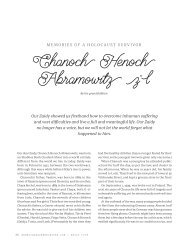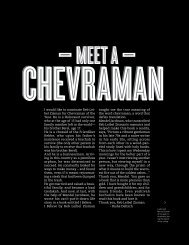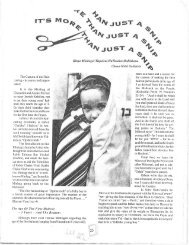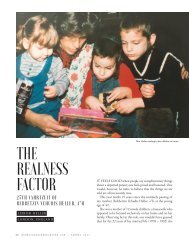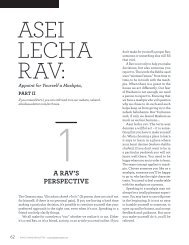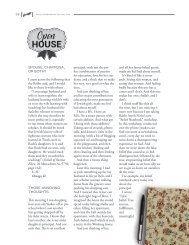Sugar
You also want an ePaper? Increase the reach of your titles
YUMPU automatically turns print PDFs into web optimized ePapers that Google loves.
have perfect physical bodies. Nor<br />
are we here to soar to the heavens<br />
and neglect our physical needs. The<br />
core teaching of Chassidus is that<br />
our purpose is to form a partnership<br />
between the physical and spiritual,<br />
where the body serves the soul and<br />
vice versa. We fulfill our mission by<br />
making peace between the needs of<br />
the body and soul.<br />
• Hashem created us with an ongoing<br />
need for food and drink, so that with<br />
every bite we take we reveal that<br />
Hashem is our true source of life and<br />
sustains the world at every moment<br />
(Sefer Hasichos 5751, p. 654).<br />
• When Hillel would sit down to eat he<br />
famously said, “I’m going to do a favor<br />
for the lowly and poor creature.” In<br />
other words, he treated his body as<br />
a small child or animal that one is<br />
obligated to care for (Tanya Chapter<br />
27).<br />
• Chassidus teaches us to “refine<br />
ourselves with what is permitted to<br />
you.” Kadesh atzmecha bemutar lach.<br />
The word “mutar” means unbound.<br />
An unkosher food is assur—meaning<br />
that it is bound to the kelipah and<br />
cannot be elevated. A kosher food,<br />
on the other hand, is unbound and<br />
can be made holy as long as we eat it<br />
with the right intentions. When we<br />
eat food only to indulge ourselves,<br />
we are not nourished by it but on<br />
the contrary, it weakens us both<br />
physically and spiritually (Tanya<br />
Chapter 27).<br />
• When we eat and drink not out of<br />
physical desire but out of a desire to<br />
broaden our minds in the service of<br />
Hashem, or to fulfill the mitzvah of<br />
enjoying Shabbos and Yom Tov, then<br />
the eating is a mitzvah in itself. On<br />
the other hand, if we eat gluttonously,<br />
only to fulfill the body’s desires, then<br />
the life-force in the food and drink<br />
becomes degraded and drawn down<br />
into evil. This is only temporary,<br />
however. By doing teshuvah we can<br />
elevate the food and restore it to<br />
kedushah (Tanya Chapter 7).<br />
• Delaying gratification even for a short time helps to drive out the<br />
yetzer hara. In the time of the Gemara, the average person would<br />
eat at the fourth hour (from sunrise) while tzaddikim would eat at<br />
the sixth hour, and would use the two-hour delay to study Torah.<br />
This was how they learned to restrain and master their desires<br />
(Tanya, Chapter 27).<br />
• There is a famous vort of the Baal Shem Tov on the passuk in<br />
Tehillim (106:5), “Hungry as well as thirsty, their soul enwraps<br />
itself in them.” When the body is hungry or thirsty for physical<br />
nourishment, it is actually the soul that is hungry for the sparks<br />
of kedushah in that food. In other words, even though we may<br />
think it is our body that wants food, it is actually our soul that<br />
craves it, so it can elevate that spark to kedushah (Keser Shem Tov.<br />
See also Likutei Sichos vol. 19, p. 295).<br />
• Having temptations and cravings are a natural state for all of us<br />
who are not tzaddikim. Therefore, being sad over the fact that we<br />
struggle with cravings shows that one simply lacks self-awareness<br />
and thinks he’s a tzaddik! Instead of being angry or depressed when<br />
a craving or negative thought arises, rejoice—because this gives<br />
you the opportunity to fulfill a mitzvah by ignoring that thought<br />
(Tanya Chapter 27).<br />
• “If someone sanctifies himself in a small measure here below, he<br />
is sanctified greatly from above.” When we make a small effort to<br />
master our impulses, these efforts are aided from above and in<br />
time the yetzer hara gets driven out completely (Tanya Chapter 27).<br />
The Fire Within<br />
TAMAR STONE<br />
CROWN HEIGHTS, NY<br />
I<br />
don’t remember when it began, but I do remember when I had<br />
had enough. I reached my limit on Rosh Chodesh Cheshvan 5776.<br />
I knew I had a problem, but I kept hoping it would go away. It<br />
didn’t, though, and by Cheshvan I was a mess. I didn’t sleep through<br />
the night. I felt trapped and tired, oh, so tired. I had begun to have<br />
weird thoughts, which seemed to take on a life of their own; waking<br />
dreams that morphed into nighttime terrors. My kids were scared. My<br />
husband was worried. My parents were upset. No one could talk to<br />
me. To the world I was a short-tempered, nasty, glassy-eyed shadow<br />
of my former self.<br />
It was time to get help, and even I—forever living in the town of<br />
deNile—had to admit the truth.<br />
I had heartburn.<br />
But not just any heartburn. It was a red-hot fire that started on the<br />
tip of my tongue and ended somewhere around my knees, a 24-hour<br />
non-stop pain that made me numb. The flames liked to show up at<br />
inopportune times: at rush hour when I needed to make dinner for<br />
the family, do homework with the kids, or attend PTA…and it was<br />
64 NSHEICHABADNEWSLETTER.COM | KISLEV 5778




